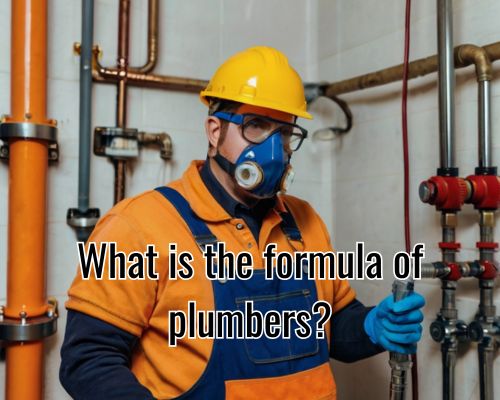Plumbing is an essential trade that ensures the seamless flow of water, gas, and waste systems in residential, commercial, and industrial properties. If you’ve ever wondered, “What is the formula of plumbers?”—you’re not alone. This phrase can be interpreted in various ways: the core principles that govern plumbing, the mathematical calculations involved in plumbing work, and even the business model that makes a plumbing service successful. In this guide, we’ll explore all these aspects while incorporating local insights specific to Australia.

Understanding the Core Formula of Plumbing
At its core, plumbing follows a combination of scientific principles, engineering concepts, and skilled craftsmanship. The primary formula governing plumbing systems includes:
1. Water Pressure & Flow: The fundamental formula for water flow in pipes follows Bernoulli’s equation: P+12ρv2+ρgh=constantP + \frac{1}{2} \rho v^2 + \rho gh = constant This equation helps plumbers calculate the pressure loss and ensure proper water distribution in buildings across Australia.
2. Pipe Sizing Formula: Correct pipe sizing is crucial to prevent issues like low water pressure or excessive friction losses. The Hazen-Williams equation is widely used: V=k⋅C⋅Rn⋅SmV = k \cdot C \cdot R^n \cdot S^m where V is velocity, C is the roughness coefficient, R is the hydraulic radius, and S is the slope of the energy grade line.
3. Gas Flow Equations: Australian plumbers working with gas lines use Boyle’s Law and the Ideal Gas Law: PV=nRTPV = nRT This ensures safe gas pressure regulation in homes and businesses.
Plumbing Regulations and Standards in Australia
Australia has strict plumbing standards that all licensed plumbers must follow. The National Construction Code (NCC) and the Plumbing Code of Australia (PCA) set the framework for compliance. Some key standards include:
- AS/NZS 3500: Governs water supply, drainage, and gas fitting.
- AS 5601: Covers gas installations.
- State-Specific Licensing: Each state, from New South Wales (NSW) to Victoria (VIC) and Queensland (QLD), has unique plumbing licensing requirements.
Before hiring a plumber, Australians should always check if they hold a valid license from bodies like the Victorian Building Authority (VBA) or the Queensland Building and Construction Commission (QBCC).
Essential Skills and Training for Plumbers in Australia
To become a qualified plumber in Australia, one must complete a Certificate III in Plumbing (CPC32420) followed by an apprenticeship. Core skills include:
- Reading blueprints and technical drawings.
- Installing and maintaining pipework and drainage systems.
- Gas fitting and appliance installation.
- Backflow prevention and testing.
With growing demand for sustainable solutions, plumbers in cities like Sydney, Melbourne, Brisbane, and Perth also specialize in rainwater harvesting systems, solar hot water systems, and energy-efficient plumbing designs. See https://plumberwarragul.com.au/ for more.
The Business Formula for a Successful Plumbing Service in Australia
For those looking to run a successful plumbing business in Australia, here’s the essential formula:
- Licensing and Compliance: Ensure your business is registered and meets all Australian plumbing regulations.
- SEO-Optimized Online Presence: Ranking for keywords like “best plumber in Melbourne” or “emergency plumber Sydney” can drive leads.
- Local Citations: Listing your service on directories like Yellow Pages, ServiceSeeking, and Hipages enhances visibility.
- Customer Reviews: Positive Google My Business (GMB) reviews boost credibility.
- Emergency Services: Offering 24/7 emergency plumbing in major cities like Adelaide and Gold Coast attracts more clients.
Common Plumbing Issues in Australian Homes
Plumbing issues can be unique to Australian climates and housing structures. Some common problems include:
- Blocked Drains: Tree roots often infiltrate pipes, especially in older suburbs like Hawthorn (VIC) and Newtown (NSW).
- Hard Water Damage: Areas like Perth and Adelaide have higher mineral content in water, affecting plumbing fixtures.
- Burst Pipes in Winter: In regions like Canberra and Tasmania, cold temperatures cause pipe freezing.
- Hot Water System Failures: Many homes in Brisbane rely on solar hot water systems, which require regular maintenance.
Future of Plumbing in Australia: Sustainability and Smart Technology
As Australia moves towards greener solutions, the plumbing industry is adapting with:
- Greywater Recycling Systems: Used in Melbourne homes to conserve water.
- Smart Leak Detection Systems: IoT-based devices alert homeowners to leaks in real-time.
- Hydronic Heating Systems: Gaining popularity in colder regions like Victoria and Tasmania.
Government incentives such as the Victorian Energy Upgrades (VEU) program encourage homeowners to invest in energy-efficient plumbing solutions.
Conclusion
The formula of plumbers in Australia is a blend of engineering principles, regulatory compliance, hands-on skills, and business acumen. Whether you’re a homeowner seeking reliable plumbing services or an aspiring plumber looking to build a career, understanding these core elements is essential.
For anyone in Sydney, Melbourne, Brisbane, or Perth, finding a licensed plumber like Dean Owens from Plumber Warragul ensures quality workmanship and compliance with Australian standards. If you’re looking for eco-friendly plumbing solutions, now is the time to explore sustainable options tailored to Australia’s unique climate and water conservation needs.